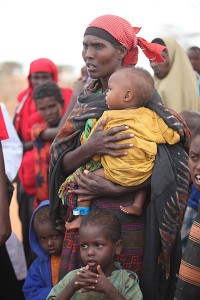ngo
As of Oct. 25, French authorities have begun demolishing the migrant camp known as “the Jungle” in the city of Calais, reports CNN. The camp — stretching nearly 4 square kilometers — was home to more than 3,100 migrants. Many of these migrants have been bussed from the camp to other regions in France.

Image via Milosz_G/Shutterstock
For those of us who work in the world of faith-based non-governmental organizations (NGOs), we're well accustomed to the snubs and not-so-subtle criticism of our “secular” NGO peers. All too often, we're seen as nothing more than the offspring of those overly zealous missionaries of old who partnered all too well with historical colonialism. As a result, we constantly are attempting to distance ourselves from this characterization of the Bible-thumping fundamentalist who triumphantly arrives to save the poor from their poverty and the ignorant from their ignorance.
Unfortunately, the Messiah complex mentality that typified the majority of those first outsiders who arrived with the “good news” — that turned out to be bad news for so many traditional cultures around the world — isn't simply a remnant from the past, but a mentality that is still very much present and influential.
HILDA DE BOJORQUEZ holds a set of blueprints in one hand. Her other hand is pointing. At a better future, perhaps, if things go well.
De Bojorquez is the chief engineer at this construction site in a neighborhood just outside Port-au-Prince still blemished with rubble from Haiti’s 2010 earthquake. She commands respect from the all-male crew of Haitians working at the site—she tells a group of visiting U.S. reporters that her gender has never been an issue in the male-dominated world of construction, here or in her native El Salvador.
When asked about obstacles on the project, De Bojorquez goes on for 15 minutes—she’s an engineer, after all—but the point is that they’ve tackled them, one by one, and done so the right way. She extols the importance of a solid foundation and robust retaining walls. She points to the cinder blocks and the rebar, and explains how her group had to teach a company how to provide high-quality materials, with the promise that they’d buy everything the company made. And she emphasizes that she’s there not just to oversee a number of construction projects, but to train Haitians to do it themselves the next time—and to do it right.
The steel-reinforced blocks are rising into walls that will surround a new six-room school for perhaps 200 children in this neighborhood four miles east of Port-au-Prince. The narrow site is wedged between two crumbling buildings, both showing earthquake damage. Even to an untrained eye, the differences are obvious between the fragile, deteriorating blocks next door and the solid retaining walls rising at our feet.

As Christians are we not obligated to help those who area most in need? Should we only focus on those in our own country who need our help, or does God's command us to ignore borders?
How might the words of the biblical prophet Isaiah resonate with us today, when he says: "If you spend yourselves on behalf of the hungry and satisfy the needs of the oppressed, then your light will rise in the darkness, and your night will become like the noonday."
From the official statement by #OccupyWallStreet: "As one people, united, we acknowledge the reality: that the future of the human race requires the cooperation of its members; that our system must protect our rights, and upon corruption of that system, it is up to the individuals to protect their own rights, and those of their neighbors; that a democratic government derives its just power from the people, but corporations do not seek consent to extract wealth from the people and the Earth; and that no true democracy is attainable when the process is determined by economic power."
In Climate of Change, director Brian Hill tells the story of how ordinary people from around the world are taking action steps to save the environment.
Reported in a recent Times article, leading non-governmental organizations (NGOs), speculate that the militarization of aid in Afghanistan blurs lines between military and humanitarian responses, jeopardizing the success of projects and the lives of staff, wanting a return of all aid work to NGOs.
Development is a word full of hope. It brings to mind water pumps and rice banks, bridges and education, smiling children and sky-scraping financial institutions. Yet there is a dark side to development.
On Friday, July 17th, at 4 a.m., this dark side showed its face when


